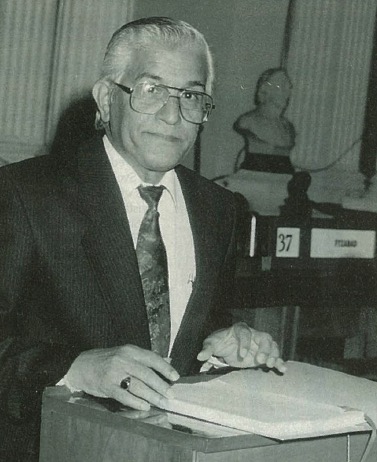By ANIL MAHABIR, TRINIDAD
WITH A HINDU PRIME Minister and a Hindu majority cabinet and government, Trinidad & Tobago is experiencing a fresh breeze–some say a tornado–of psychological, cultural, social and legislative change. Hindu groups have never been more vocal in their demands for changes to the archaic colonial laws which foster unequal treatment of faiths.
Basdeo Panday himself set the tone for the Hindu resurgence in 1986 as Trinidad’s first Hindu cabinet minister. He caused a two-hour delay in his own swearing-in ceremony when he refused to take his oath of office on a Christian Bible and demanded instead the Bhagavad Gita–which had to be purchased in a local bookstore. Previous Indian ministers in the government had invariably converted to Christianity. In 1996, Basdeo became the country’s first Hindu prime minister. The once silent Hindu leaders are now clamoring for change. Sat Maharaj, leader of the Sanatan Dharma Maha Sabha, has been in the forefront of the crusade designed to have certain laws and practices changed to treat all religions equally.
There are eight such laws. One is Blasphemous Libel. According to the Attorney General of Trinidad & Tobago, only Christianity is protected by law from blasphemy. Blasphemy is specifically defined as “any contemptuous, reviling, scurrilous or ludicrous matter relating to God, Jesus Christ or the Bible, or the formularies of the Church of England as by law established” [Chapter 27.I.C]. A 1991 attempt to extend it to the protection to Islam failed, and the law is specifically “restricted to attacks on Christianity.” This offense is defined in English Common Law and appears to remain in effect in England and possibly other present and former Commonwealth countries and colonies. At the time the law was formulated, Christianity was the state religion, and an attack upon it was regarded as an attack upon the state. The government wants a new law that recognizes blasphemous publications as those which revile, attack and wrongly criticize any religion in Trinidad and Tobago.
A second law cited as discriminatory makes it illegal for the armed forces to invade and search a Christian church without a warrant. The same does not apply to Hindu temples or Islamic mosques. The law originates in the medieval European custom of “sanctuary,” wherein a criminal was immune from arrest in a Christian church. The Hindu leaders want the law changed to require warrants for temples and mosques, too.
It is, however, Maharaj’s demand to cease using “amen” to end the prayer that opens each meeting of parliament which has attracted the most fire. He pointed out the parliament is a “national institution belonging to everybody in the society.” As such, he feels that Hindus should not be compelled to end their parliamentary prayer with “amen.” He wants a universal closing.
Controversy erupted immediately over his request. Non-Hindus labeled Maharaj as “racist” and his demand “out of place.” Maharaj retorted that “Amen is only part of the problem which exists in the society. The critics have missed the point completely. It is my Parliament. It is the national Parliament of Trinidad and Tobago. Whatever transpires there affects me and the Hindu community. Whenever a universal prayer is made, there is no ending. In the school system, for instance, a universal prayer is said and there is no ending. Further, the Inter-Religious Organization had a prayer framed for radio programs and there is no ending in that prayer. I have no problem with the Christians saying ‘amen,’ but if it is a national prayer, it should reflect everyone.” Raji Ji, head of the Hindu Prachar Kendra, supported Maharaj’s efforts and said, “The issue has to do with having laws which are reflective of a plural society.”
In a document titled “Reform of Media Law: Towards a Free and Responsible Media” the government has signalled its intention to change certain laws that enforce inequality. The proposals are in the “Green Paper” stage, meaning still open for comment and review before being submitted to parliament.
Hindus count it imperative that laws reflect the constitution of Trinidad & Tobago, which guarantees freedom of religious expression and allows for the peaceful co-existence of all religions. This ideal is stated in the country’s national anthem, “Here every creed and race finds an equal place.” Hindus in other countries, especially those with systems based on English common law, such as the former colonies, should research their laws and see if such discriminatory statutes still exist in their judicial system.
TO COMMENT WRITE: OFFICE OF THE ATTORNEY GENERAL, ATTORNEY GENERAL CHAMBERS, “COMMENTS PERTAINING TO GOVERNMENT GREEN PAPER: REFORM OF MEDIA LAW,” PORT OF SPAIN, TRINIDAD AND TOBAGO
